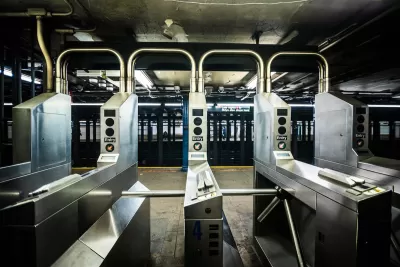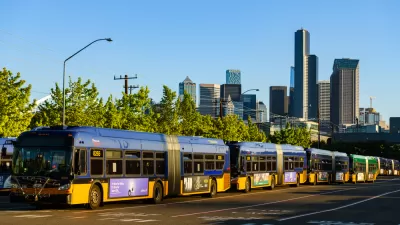The loss of revenue from fare evasion is a drop in the bucket compared to the fiscal cliff facing major U.S. transit agencies.

In an opinion piece published in Streetsblog, Sogand Karbalaieali argues that debates over fare evasion on public transit systems largely miss the point.
According to Karbalaieali, the revenue losses caused by people jumping turnstiles or failing to tap their payment cards pale in comparison to “a more significant and fundamental problem:” the massive budget shortfalls faced by many U.S. transit agencies, including the the Washington Metropolitan Area Transit Authority (WMATA) in Karbalaieali’s home region.
While news outlets are preoccupied with fare evasion and WMATA's strategies to combat it, a more significant question emerges: How else can WMATA generate revenue?
Karbalaieali suggests “creative solutions for generating revenue through underutilized parking spaces” by converting WMATA-owned lots to other types of development. The article also blames parking requirements for driving up the cost of housing.
Ultimately, Karbalaieali writes, fare evasion is a distraction from much more critical priorities. “While addressing fare evasion is important, the more pressing urgency lies in achieving our climate goals, promoting healthy lifestyles, fostering sustainable transportation, and building resilient infrastructure.”
FULL STORY: Opinion: Fights Over Fare Evasion Are Missing the Point

Alabama: Trump Terminates Settlements for Black Communities Harmed By Raw Sewage
Trump deemed the landmark civil rights agreement “illegal DEI and environmental justice policy.”

Study: Maui’s Plan to Convert Vacation Rentals to Long-Term Housing Could Cause Nearly $1 Billion Economic Loss
The plan would reduce visitor accommodation by 25% resulting in 1,900 jobs lost.

Planetizen Federal Action Tracker
A weekly monitor of how Trump’s orders and actions are impacting planners and planning in America.

Wind Energy on the Rise Despite Federal Policy Reversal
The Trump administration is revoking federal support for renewable energy, but demand for new projects continues unabated.

Passengers Flock to Caltrain After Electrification
The new electric trains are running faster and more reliably, leading to strong ridership growth on the Bay Area rail system.

Texas Churches Rally Behind ‘Yes in God’s Back Yard’ Legislation
Religious leaders want the state to reduce zoning regulations to streamline leasing church-owned land to housing developers.
Urban Design for Planners 1: Software Tools
This six-course series explores essential urban design concepts using open source software and equips planners with the tools they need to participate fully in the urban design process.
Planning for Universal Design
Learn the tools for implementing Universal Design in planning regulations.
Caltrans
Smith Gee Studio
Institute for Housing and Urban Development Studies (IHS)
City of Grandview
Harvard GSD Executive Education
Toledo-Lucas County Plan Commissions
Salt Lake City
NYU Wagner Graduate School of Public Service





























